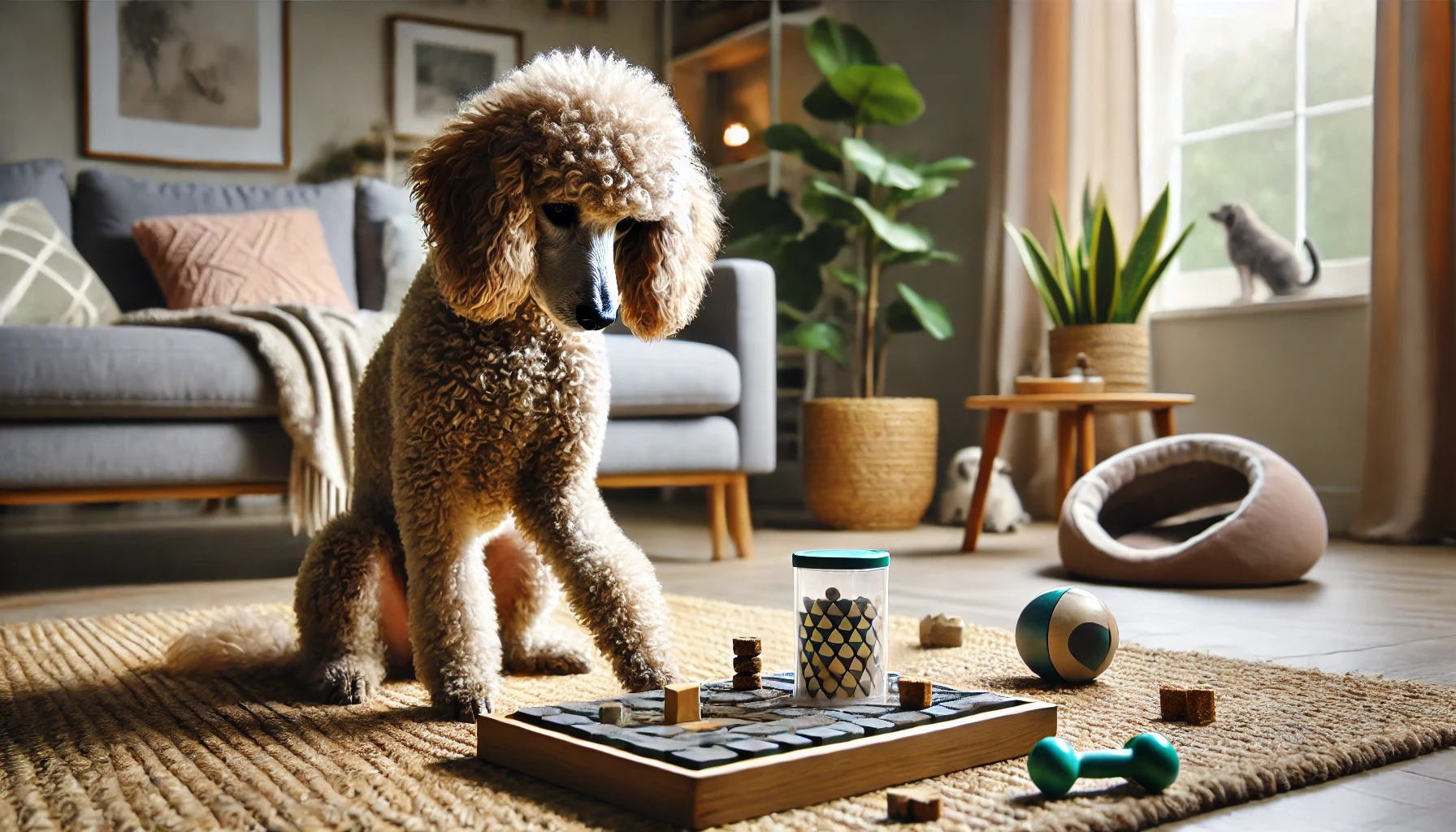On this page
How Much Mental Stimulation Does a 9-Month-Old Standard Poodle Need Daily?
Yes, a 9-month-old Standard Poodle requires significant mental stimulation daily to stay healthy and happy. Known for their intelligence and high energy levels, Standard Poodles are prone to boredom and frustration if their mental needs aren’t met. This can lead to unwanted behaviors like excessive barking, chewing, or digging.
At this age, your Poodle is transitioning from puppyhood to adolescence, a critical phase where their cognitive abilities and curiosity are rapidly developing. Providing structured mental activities not only keeps them engaged but also reinforces good behavior and strengthens your bond.
Why Do Standard Poodles Need Mental Stimulation?
Does your Poodle’s breed make mental stimulation essential? Yes, Standard Poodles are one of the most intelligent breeds, requiring activities that challenge their minds.
Key Reasons Mental Stimulation Is Crucial:
Intelligence: Their sharp minds demand constant engagement to prevent boredom.
Energy Levels: Mental activities help expend energy, reducing hyperactivity.
Behavioral Benefits: Stimulated dogs are less likely to develop destructive habits.
Bonding: Engaging your Poodle in interactive activities strengthens your relationship.
Dr. Emily Larson explains, “Poodles need daily mental challenges to stay balanced and well-behaved, especially during their adolescent phase.”
Why Standard Poodles Stand Out:
Compared to breeds like Bulldogs, Poodles require more advanced and varied mental exercises.
Their eagerness to learn makes them perfect candidates for training and puzzles.
How Much Mental Stimulation Does Your Poodle Need?
Is there a recommended amount of mental stimulation for 9-month-old Poodles? Yes, at least 1-2 hours of structured mental activities daily is ideal.
Suggested Time Allocation:
Interactive Play: 30 minutes (e.g., tug-of-war, hide-and-seek).
Training Sessions: 20 minutes twice a day (e.g., obedience, tricks).
Puzzle Toys: 20-30 minutes to challenge problem-solving skills.
Exploration Walks: 30 minutes incorporating sniffing and new environments.
Dr. Michael Carter advises, “While physical exercise is important, mental stimulation is equally vital for intelligent breeds like Standard Poodles.”
Why It Matters:
Mental stimulation tires your dog’s brain, providing the same benefits as physical activity.
A well-stimulated dog is less likely to show stress-related behaviors like whining or digging.

What Activities Provide the Best Mental Stimulation for Standard Poodles?
Are specific activities more effective for engaging Poodles? Yes, activities that combine problem-solving, training, and play are best.
Top Activities for Mental Stimulation:
Puzzle Toys: Use treat-dispensing toys to challenge their problem-solving skills.
Scent Work: Hide treats or toys around the house for your dog to find.
Obedience Training: Teach advanced commands like “spin” or “weave.”
Interactive Games: Try games like hide-and-seek or fetch with a twist (e.g., alternating between commands).
Dr. Laura Bennett recommends, “Rotate activities daily to keep your Poodle mentally stimulated and prevent boredom.”
Comparison With Other Breeds:
Standard Poodles excel in activities requiring intelligence and focus, unlike breeds like Dachshunds, which may prefer simpler tasks.
Their trainability makes them ideal for advanced tricks and agility courses.
Can Mental Stimulation Replace Physical Exercise?
Is mental stimulation a substitute for exercise? No, both are essential for a balanced routine.
Why Balance Is Key:
Physical Exercise: Burns energy and keeps your dog fit; recommended 1-2 hours daily.
Mental Stimulation: Engages their brain, reducing stress and preventing boredom.
How to Combine Both:
Use “brain games” during walks, like stopping for commands or incorporating scent work.
End physical activities with a cool-down puzzle game or training session.
Alternate high-energy activities (e.g., fetch) with focused tasks (e.g., solving puzzles).
Dr. Rebecca Allen explains, “Mental stimulation complements physical exercise, ensuring a well-rounded, happy dog.”
What Are the Signs of Insufficient Mental Stimulation?
Could your Poodle’s behavior indicate a lack of mental engagement? Yes, certain signs show your dog isn’t getting enough stimulation.
Signs of Boredom or Frustration:
Destructive Behavior: Chewing furniture, digging, or shredding items.
Restlessness: Pacing, excessive barking, or whining.
Lack of Focus: Difficulty following commands or staying attentive during training.
Hyperactivity: Overexcited behavior even after physical exercise.
Dr. Sarah Thompson notes, “Boredom in Poodles often leads to behavioral issues, which can escalate if their mental needs remain unmet.”
How to Address It:
Increase the variety and difficulty of activities.
Introduce new toys or training challenges.
Ensure daily consistency to meet their stimulation needs.

Meeting Your Poodle’s Mental Stimulation Needs
A 9-month-old Standard Poodle thrives on 1-2 hours of daily mental stimulation through puzzles, training, and interactive play. Balancing this with physical exercise ensures your dog remains happy, healthy, and well-behaved. Understanding your Poodle’s needs and incorporating varied activities into their routine helps prevent boredom and fosters a stronger bond.
Keep your Poodle’s mind sharp and engaged with Dosty’s expert tips and tools. Download the app today!


